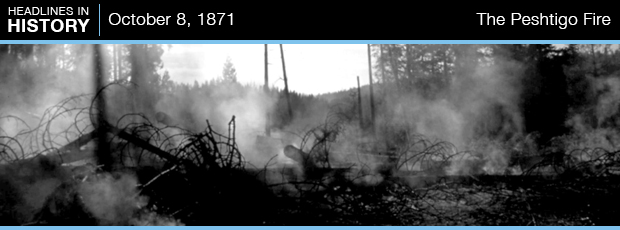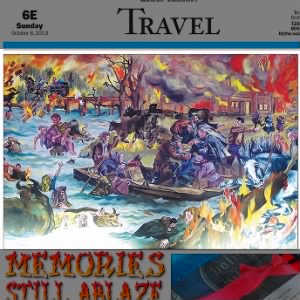
The deadliest forest fire in American history swept through Northeast Wisconsin on October 8, 1871. The Peshtigo fire, named after the small town it obliterated, claimed 1200 lives. The Peshtigo fire has been somewhat ignored by history because it started the same day as the great Chicago fire.

It was an unusually dry summer that year. Small fires used to clear land for farming and railroads had been smoldering, but didn’t cause alarm. That all changed on the evening of October 8th. As parents tucked their children into bed, an ominous rumbling “like the distant roaring of the sea or like a coming storm” had them nervously scanning the horizon. In the distance they could see the glow of a fire. The winds were picking up, but residents still had no idea what was approaching.
About 10 p.m., hurricane force winds, accompanied by lightning, blew into town. Gusts that preceded the firestorm ripped roofs from houses and felled large trees. Alarmed residents ran to investigate and witnessed a huge inferno, described as a tornado of flame, bearing down.
The Guardian, reported that “The wind blew with such tremendous violence that people endeavoring to escape were lifted from their feet and blown into burning houses. The wind blew super-heated clouds of sand on to those running to escape. Each grain burning and blistering.”
Those that could, began a mad dash to the river. Mothers, unable to make it to the water, tried desperately to protect their children from the flames. The fire was an “oxygen-sucking firestorm” whose power has been compared to an atomic bomb. Residents, unable to outrun the fire, burst into flames. Those that did reach the river encountered frightened livestock that trampled over them. Burning logs floated on the river’s surface. Once immersed in the river, faces of those trying to escape were badly burned each time they surfaced for air. Some, unable to make it to the river, jumped in wells to escape the flames. The intense heat caused the water to boil, killing them. Within two hours the town was reduced to ashes.
When relief workers entered Peshtigo after the fire, they found the town and surrounding woods littered with burned bodies. As the magnitude of destruction became apparent, people from surrounding towns stepped up to care for survivors. Those who managed to survive the flames lost everything. Today, Peshtigo is rebuilt and thriving, and as the Green Bay Press-Gazette says, is “Truly reborn from the ashes.”
If you would like to learn more about the Peshtigo fire, or have ancestors from that area, search our archives at Newspapers.com to learn more!


We think we know so much about our country’s human experiences and we really know so little. Maybe that is part of the reason we live in the cultural mayhem we do today…We forget so easily! or, we do not pay attention!
or, we’re glued to our smartphones and kindles and ipads.
…where we learn about things like this.
…and not learn how to interact with people
There are many ways to communicate: email, Facebook, person to person, radio, etc.
very trite reply. Try to add to the conversation
That’s where I learned about this Without electronics and digital scanning our knowledge would be much more limited.
We can get a lot of knowledge from the resources of the internet, but look how people interact on YouTube video comments. A lot of people seem to show up only to make negative remarks. (cough cough)
It is not a natural environment and it seems to breed incivility.
Agree
Insightful and very true
AMEN!
So true.
“To be ignorant of what occurred before you were born is to remain always a child. For what is the worth of human life, unless it is woven into the life of our ancestors by the records of history?”
attributed to Marcus Tullius Cicero
So astute! Thanks for sharing this wonderful quote.
Lilian Jackson Braun put a one man show about a devastating fire in one of hr The Cat Who books. I did not know what fire it was based on
Quoting Teresa from Oct 1st: “We forget so easily! or, we do not pay attention!”. Not just our tragedies but O so true with our politicians.
I lost distant relatives in this fire and more from the health problems that developed later. My grandmother’s brother-in-law lost his first wife’s mother and her baby in the fire, and his wife suffered health problems thought to be due to the effects of the fire. After her death he married my grandmother’s sister. I have been to the museum in Peshtigo which is so interesting.
I first learned about the Pest. fire when I lived in Wisconsin. It an eye opening experience for me. There were other fires in Michigan and Illinois, besides Chicago! Roberta
Although my great grands and a few of their children had an “address” in Peshtigo, they were not caught in the fire. But I’m sure it affected their livelihood. I had not heard of the fire until a few years ago when I started doing genealogy research.
The family name was Bartels.
JF Bartels?
If we don’t study and learn about OUR past, are we not doomed to repeat it with devastating results.
I had owned a hobby farm with 4 acres plus the outbuildings. One log barn showed fire burn marks inside the huge sliding doors. The Peshtigo Fire had burned the barn somewhat. The story goes that the Peshtigo fire had jumped The bay of Green Bay and travel the distance to South of Algoma, Wi. The Homestead dates back to the 1860’s. The house and barns are all log buildings.
But there was one place in the middle of that fire where people were saved from the flames. It was the spot where our Blessed Mother Mary appeared earlier. It is now the Shrine of Our Lady of Good Help. And it is a beautiful place to visit.
What is the price?
Same day there was fire in Manistee, MI across Lake . My Greatgrandmother’s the husband was killed trying to rescue people . Big day (and Wind ) for fires all thru the area .
The fire also crossed clear across the state of Michigan. From Lake Michigan to Lake Huron.
We visited Peshtigo last summer and were moved by the many heartbreaking stories found amongst the headstones in the graveyard next to the museum.
In the 1870 census my great-great grandmother (whose first husband died of illness in the Civil War) was living with her kids in Menominee MI and my great-great grandfather (who had a heck of a story in the Civil War) was working at a sawmill out towards Minneapolis. They somehow met, and had their first child together in Menominee by about 1873, and then were all living together near Sturgeon Bay WI for the 1880 census. I often wonder if the Peshtigo fire somehow brought them together… perhaps he came to the area as a relief worker?
Sadly, their daughter born about 1875 disappeared mysteriously and is thought to have possibly died in the great fire at Cloquet MN in October of 1918.
Fuzzbean. . . My great grandfather, from Menominee, was the one who built that sawmill. They had a trading post which burned down in the fire, but they escaped with their lives. There is some valid speculation, based on astronomical reports, that an asteroid was seen, came down, in that storm, and that it flew over the water to the western side of Michigan.
Sorry, they were great great grandparents.
What was your great-great grandfather’s name?
The reason there were so many fires on that day was because an asteroid broke up in the atmosphere. The fake news story of the Chicago fire being started by a milkmaid knocking over a lamp has been perpetuated over the years with absolutely no evidence.
Where is the evidence of the asteroid?
Lou: I’ve seen references to that asteroid–but it was in articles that I read at least twenty years ago. (My interest was because I had great grandparents whose trading post was burned down in the fire) My memory was that it was both seen, reported, and had some astronomical backup info.
Sorry, they were great great grandparents.
It was Mrs. O’Leary’s cow that kicked over the lantern , doncha know !!!
The real reason for such bad fires was the poor lumbering of the forests , leaving so much flammable material in the dry, windy weather.
What my Ancestors had to endure to live (survive), in any Century, I can not really grasp the “reality” of their way of Life.
When I started my Ancestry research, to build my Tree, my thought process was – wow, they were born in ****, and left it at that.
But later, after reading about the Pilgrims, Jamestown, and my Family’s migrations, etc, I am awe struck at their way of life. I have to keep reminding myself that my Ancestors did not have the “conveniences” of later Generations. To 2nd guess their “responses” to situations is not realistic.
My Great-great-great grandparents were living in Nasawaupee just southwest of Sturgeon Bay, Wisconsin when this fire occurred. They lost everything in the fire and barely escaped along with one of their sons. They spent the winter in Sturgeon Bay with one of their married daughters until they could rebuild their small farm. The fire affected my G-g grandmother’s mental health because of what she saw and endured that night. Her son died a short time later and within a year or two she was sent to the Oshkosh Mental hospital where she died. My mother told me about about a story my grandmother told her about a woman who was driven crazy by the fire. I don’t think she ever knew the woman was her mother’s grandmother. It goes to show you how mental problems were often a shame to any family at that time.
Amazingly, UPI has archived my 1985 story about a book that supports the theory of Biela’s Comet and its possible role in the Midwest Fires of October 1871. Even as a lifelong Chicagoan it was a profound moment in my life to learn of this phenomenon. I know science says it is unlikely, but that doesn’t mean impossible. Think about it.
The link is here:
https://www.upi.com/Archives/1985/12/31/Author-links-Chicago-fire-to-stray-comet/9971504853200/
Those firestorms were created by the bombing of Hamburg, Dresden, Tokyo and many other cities in the Allied bombing campaigns of WWII killing hundreds of thousands of non-combatants.
I think your dates are off by half a century
This is exactly the same story I heard about the fire that burned Cornell, MI, on the Escanaba River in Michigan’s U.P.. I was told the town was thriving until the fire, and when I lived there it was considered a ghost town.
I’m not one to be preached at, or believe in mythical stories. I guess some readers just have to make a comment, even it it’s off the subject. ’nuff said.